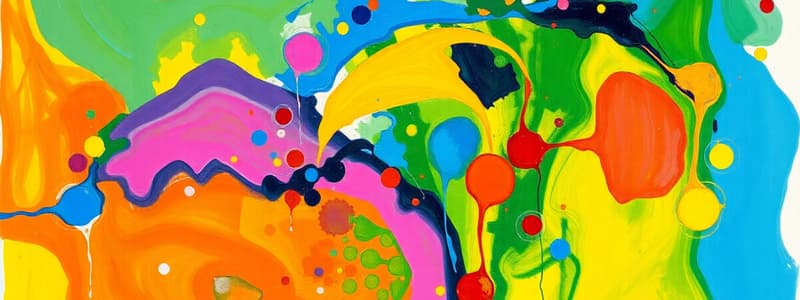Podcast
Questions and Answers
Water freezes at ______ degrees Celsius.
Water freezes at ______ degrees Celsius.
0
Water boils at ______ degrees Celsius.
Water boils at ______ degrees Celsius.
100
What is the name of the state of matter when water is frozen?
What is the name of the state of matter when water is frozen?
Solid
What is the name of the state of matter when water is a liquid?
What is the name of the state of matter when water is a liquid?
What is the name of the state of matter when water is a gas?
What is the name of the state of matter when water is a gas?
What is the name of the process when a solid changes into a liquid?
What is the name of the process when a solid changes into a liquid?
What is the name of the process when a liquid changes into a gas?
What is the name of the process when a liquid changes into a gas?
How many grams of salt can dissolve in 100mL of water at room temperature?
How many grams of salt can dissolve in 100mL of water at room temperature?
Sugar is more soluble in water than salt.
Sugar is more soluble in water than salt.
Match the following reactants and products to their chemical formulas:
Match the following reactants and products to their chemical formulas:
How many products are formed in the reaction between hydrochloric acid and sodium bicarbonate?
How many products are formed in the reaction between hydrochloric acid and sodium bicarbonate?
Which of the following materials will float in water?
Which of the following materials will float in water?
What is the density of water?
What is the density of water?
Which of the following substances is acidic?
Which of the following substances is acidic?
Which of the following substances is basic?
Which of the following substances is basic?
Which of the following substances is neutral?
Which of the following substances is neutral?
What is the pH level of vinegar?
What is the pH level of vinegar?
What is the latent heat of fusion for water?
What is the latent heat of fusion for water?
How much energy is required to melt 1kg of ice?
How much energy is required to melt 1kg of ice?
Flashcards
State of matter of water at 0°C
State of matter of water at 0°C
Water at 0°C exists in the solid state (ice).
State of matter of water at 100°C
State of matter of water at 100°C
Water at 100°C exists in the gaseous state (steam).
Solubility of Salt in water (g/100mL, 25°C)
Solubility of Salt in water (g/100mL, 25°C)
Approximately 36 grams of salt dissolve in 100mL of water at room temperature to form a saturated solution.
Products of HCl + NaHCO3 reaction
Products of HCl + NaHCO3 reaction
Signup and view all the flashcards
Material that floats in water
Material that floats in water
Signup and view all the flashcards
Acidic substance pH level
Acidic substance pH level
Signup and view all the flashcards
Energy to melt 1kg of ice
Energy to melt 1kg of ice
Signup and view all the flashcards
Study Notes
Clue 1: States of Matter
- Water exists in three states: solid, liquid, and gas.
- Solid (ice) - freezing point: 0°C
- Liquid (water) - boiling point: 100°C
- Gas (steam) - boiling point: 100°C
- The temperature at which water boils is 100°C
- Using this temperature, first code can be determined
Clue 2: Water as a Solvent (Solutions and Solubility)
- Salt's solubility in water at room temperature (25°C): Specific value needed
- Sugar's solubility in water at room temperature (25°C): Specific value needed
- Finding the correct solubility values for salt and sugar (in grams/100 mL of water) is required.
- The specific solubility values (in grams) will unlock the next code.
Clue 3: Chemical Reactions (Reactants and Products)
- Hydrochloric acid (HCl) reacts with sodium bicarbonate (NaHCO3)
- This reaction forms carbon dioxide (CO2), water (H2O), and sodium chloride (NaCl).
- Balanced chemical equation: NaHCO3 + HCl → NaCl + H2O + CO2
- Four products form when these reactants meet.
- This reaction result code unlock.
Clue 4: Density and Buoyancy (Properties of Minerals)
- Materials with density less than water's (1g/cm³) will float.
- Lead: density = 11.34 g/cm³
- Aluminum: density = 2.70 g/cm³
- Wood: density = 0.70 g/cm³
- Wood will float in water.
- Using the floating material as next code
Clue 5: Acids and Bases (pH scale)
- Substances with a pH less than 7 are acidic.
- Substances with a pH greater than 7 are basic.
- Substances with a pH of 7 are neutral.
- pH of vinegar is less than 7.
- The pH level (value) for vinegar is the next code.
Clue 6: Phase Changes and Energy (Latent Heat)
- The latent heat of fusion of water: 334 J/g
- To melt 1 kg (1000g) of ice, the formula: Energy = mass x latent heat
- Calculating the energy needed to melt 1 kg of ice will be your final code (in Joules).
Studying That Suits You
Use AI to generate personalized quizzes and flashcards to suit your learning preferences.




